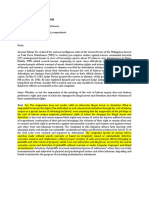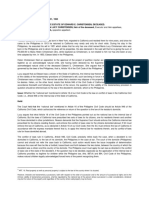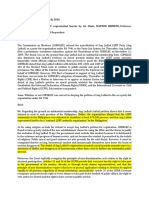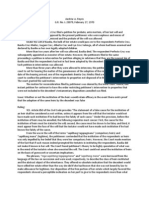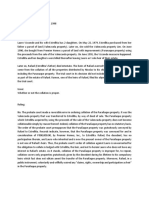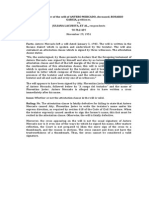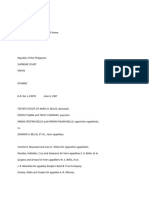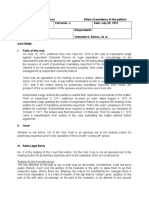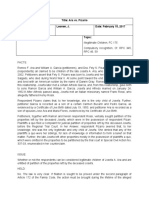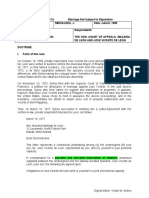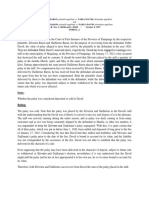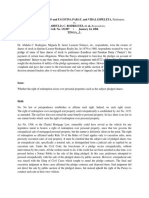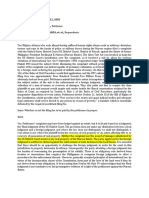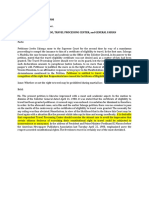07 - Estate of Amos Bellis
07 - Estate of Amos Bellis
Uploaded by
OM MolinsCopyright:
Available Formats
07 - Estate of Amos Bellis
07 - Estate of Amos Bellis
Uploaded by
OM MolinsOriginal Description:
Copyright
Available Formats
Share this document
Did you find this document useful?
Is this content inappropriate?
Copyright:
Available Formats
07 - Estate of Amos Bellis
07 - Estate of Amos Bellis
Uploaded by
OM MolinsCopyright:
Available Formats
Estate of Amos Bellis
20 SCRA 358
Facts: On August 5, 1952, Amos G. Bellis executed a will in the Philippines, declaring
that his distributable estate should be divided in the following order and manner: (a)
$240,000 to Mary E. Mallen, his first wife; (b) P40,000 each to his three illegitimate
children: Amos Jr., Maria Cristina, and Miriam; and (c) the remainder to his seven
surviving children by his first and second wives, namely: Edward, Henry, Alexander and
Anna, Edwin, Walter and Dorothy.
On July 8, 1958, Amos G. Bellis died a resident of San Antonio, Texas and on September
15, 1958, his will was admitted to probate in the Court of First Instance of Manila.
People’s Bank and Trust Company paid all the bequest therein, as executor of the will. In
preparation to closing its administration, the executor submitted and filed its report,
declaring the satisfaction of Amos G. Bellis’ will.
Maria Cristina and Miriam filed their respective oppositions to the project of partition on
the ground that they were deprived of their legitimes as illegitimate children. On April 30,
1964, the lower court overruled the oppositions and approved the executor’s final
account, report and administration and project of partition, relying upon Article 16 of the
Civil Code, it applied the national law of the decedent (Texas law), which did not provide
for legitimes.
Issue: Whether or not Texas law or Philippine law should apply to the legitimes of the
petitioners.
Ruling: Article 16, par. 2, and Article 1039 of the Civil Code, render applicable the
national law of the decedent, in intestate or testamentary successions, with regard to four
items: (a) the order of succession; (b) the amount of successional rights; (c) the intrinsic
validity of the provisions of the will; and (d) the capacity to succeed. The appellants
would however counter that Article 17, par. 3 prevails as an exception to Article 16, par. 2
of the Civil Code.
The Court ruled it as incorrect. By deleting the phrase, “notwithstanding the provisions of
this and the next preceding article” in the incorporation of Article 11 of the old Civil Code
as Article 17 of the new Civil Code, it must have been the purpose of the Congress to
make the second paragraph of Article 16 as specific provision in itself which must be
applied in testate and intestate succession.
It is evident that whatever public policy or good customs may be involved in our system
of legitimes, Congress has not intended to extend the same to the succession of foreign
nationals. For it has specifically chosen to leave the amount of successional rights to the
decedent’s national law. As previously ruled, a provision in a foreigner’s will to the effect
that his properties shall be distributed in accordance with Philippine law and not his
national law, is illegal and void.
The Philippine law on legitimes cannot be applied to the testacy of Amos G. Bellis.
You might also like
- Berry - Sex, Economy, Freedom, Community PDFDocument32 pagesBerry - Sex, Economy, Freedom, Community PDFchakhesang100% (4)
- Aberca vs. Fabian Ver - Case DigestDocument1 pageAberca vs. Fabian Ver - Case DigestOM Molins0% (1)
- Secretary of Justice Vs Lantion - Case DigestDocument1 pageSecretary of Justice Vs Lantion - Case DigestOM Molins33% (6)
- Cayetano V Leonides Case DigestDocument2 pagesCayetano V Leonides Case Digesthistab33% (3)
- De Borja Vs de BorjaDocument2 pagesDe Borja Vs de BorjaNic Nalpen100% (2)
- Wed Me Tender PDFDocument136 pagesWed Me Tender PDFAnabella MorongNo ratings yet
- Diaz v. Iac, 150 Scra 645Document2 pagesDiaz v. Iac, 150 Scra 645Gabriel HernandezNo ratings yet
- 11 Baltazar vs. LaxaDocument1 page11 Baltazar vs. LaxaJoshua Erik MadriaNo ratings yet
- Banawa V Mirano CDDocument1 pageBanawa V Mirano CDjetzon2022No ratings yet
- Estate of Christensen Case DigestDocument1 pageEstate of Christensen Case Digesthistab100% (3)
- Bicomong Vs AlmanzaDocument2 pagesBicomong Vs AlmanzaEsraRamos100% (1)
- 06 in The Matter of The Testate Estate of Edward Christensen - Case DigestDocument1 page06 in The Matter of The Testate Estate of Edward Christensen - Case DigestOM MolinsNo ratings yet
- Ang Ladlad Vs Comelec - Case DigestDocument1 pageAng Ladlad Vs Comelec - Case DigestOM Molins100% (5)
- Garcia vs. ThioDocument1 pageGarcia vs. ThioOM MolinsNo ratings yet
- Pimentel vs. Office of The Executive Secretary - Case DigestDocument1 pagePimentel vs. Office of The Executive Secretary - Case DigestOM MolinsNo ratings yet
- African ArchitectureDocument25 pagesAfrican ArchitectureSimone Prestes100% (1)
- Estate of Amos Bellis Case DigestDocument2 pagesEstate of Amos Bellis Case Digesthistab100% (3)
- Borromeo-Herrera v. Borromeo (152 Scra 171)Document3 pagesBorromeo-Herrera v. Borromeo (152 Scra 171)MhareyNo ratings yet
- Rosales v. Rosales Case DigestDocument2 pagesRosales v. Rosales Case Digesthmn_scribd100% (1)
- 05 Estate of RodriguezDocument1 page05 Estate of RodriguezOM MolinsNo ratings yet
- 04 de La Cerna Vs Potot - Case DigestDocument1 page04 de La Cerna Vs Potot - Case DigestOM MolinsNo ratings yet
- de La Cerna vs. PototDocument1 pagede La Cerna vs. PototASGarcia24No ratings yet
- Edroso v. SablanDocument1 pageEdroso v. SablanYvon BaguioNo ratings yet
- 055 Jaboneta v. GustiloDocument2 pages055 Jaboneta v. GustiloJuno GeronimoNo ratings yet
- Austria Vs ReyesDocument2 pagesAustria Vs ReyesJacqueline Carlotta SydiongcoNo ratings yet
- Borromeo-Herrera V Borromeo Case DigestDocument3 pagesBorromeo-Herrera V Borromeo Case Digesthistab0% (1)
- Acain V CA DigestDocument3 pagesAcain V CA DigestMyrnaJoyPajoJaposNo ratings yet
- Kalaw v. RelovaDocument2 pagesKalaw v. RelovaCharmila Siplon100% (1)
- Victoria V Rigor Case DigestDocument2 pagesVictoria V Rigor Case DigesthistabNo ratings yet
- Reyes v. Barreto-Datu, G.R. No. L-17818 DigestDocument2 pagesReyes v. Barreto-Datu, G.R. No. L-17818 DigestAbilene Joy Dela Cruz100% (1)
- NERA v. RIMANDODocument1 pageNERA v. RIMANDOMhareyNo ratings yet
- Bellis Vs BellisDocument1 pageBellis Vs BellisNic NalpenNo ratings yet
- Miciano vs. Brimo (Digest)Document1 pageMiciano vs. Brimo (Digest)Theodore DolarNo ratings yet
- Ozaeta Vs CuarteroDocument1 pageOzaeta Vs CuarteroAlexis Von TeNo ratings yet
- Bonilla v. BarcenaDocument2 pagesBonilla v. BarcenaD De LeonNo ratings yet
- Dorotheo V CADocument2 pagesDorotheo V CAAnj100% (1)
- Estate of Amos BellisDocument1 pageEstate of Amos BellisMhareyNo ratings yet
- Gonzales V CADocument2 pagesGonzales V CAKristine GarciaNo ratings yet
- Roxas Vs de Jesus Succession DigestDocument2 pagesRoxas Vs de Jesus Succession DigestCJNo ratings yet
- CAYETANO vs. LEONIDAS (129 SCRA 524)Document1 pageCAYETANO vs. LEONIDAS (129 SCRA 524)MhareyNo ratings yet
- Teotico vs. Del ValDocument2 pagesTeotico vs. Del ValNap GonzalesNo ratings yet
- 30.1 in Re Petition For Adoption of Michelle Lim and Michael Jude Lim DigestDocument2 pages30.1 in Re Petition For Adoption of Michelle Lim and Michael Jude Lim DigestEstel Tabumfama100% (1)
- Ramirez v. Vda. de RamirezDocument1 pageRamirez v. Vda. de RamirezZusmitha Salcedo100% (2)
- Neri v. AkutinDocument2 pagesNeri v. AkutinCesyl Patricia BallesterosNo ratings yet
- De Borja v. de Borja, 46 SCRA 577 DigestDocument3 pagesDe Borja v. de Borja, 46 SCRA 577 DigestAbilene Joy Dela CruzNo ratings yet
- Case Digest Cruz Vs VillasorDocument2 pagesCase Digest Cruz Vs VillasorJohn Michael ValmoresNo ratings yet
- Pascual vs. de La Cruz, 28 Scra 421, No. L-24819 May 30, 1969Document2 pagesPascual vs. de La Cruz, 28 Scra 421, No. L-24819 May 30, 1969rodrigo_iii_3No ratings yet
- Case Digest Dacasin v. DacasinDocument2 pagesCase Digest Dacasin v. Dacasinfangsh100% (3)
- Parish Priest of Victoria v. Rigor (89 Scra 493)Document1 pageParish Priest of Victoria v. Rigor (89 Scra 493)MhareyNo ratings yet
- Cang v. CA Case Digest (Special Proceedings)Document7 pagesCang v. CA Case Digest (Special Proceedings)Tan DaNo ratings yet
- Vizconde Vs CADocument1 pageVizconde Vs CAKristine JoyNo ratings yet
- Fleumer Vs Hix Case DigestDocument2 pagesFleumer Vs Hix Case DigestMisty Meyers100% (1)
- 29 PCIB vs. Escolin (Art 863)Document2 pages29 PCIB vs. Escolin (Art 863)Joshua Erik MadriaNo ratings yet
- Borromeo-Herrera Vs BorromeoDocument1 pageBorromeo-Herrera Vs BorromeoAthena SantosNo ratings yet
- Gan v. YapDocument1 pageGan v. YapAnjNo ratings yet
- Palacios V RamirezDocument2 pagesPalacios V RamirezMickey Rodent100% (1)
- In The Matter of The Estate of Emil H. Johnson, 39 Phil 156, G.R. No. 12767, November 16, 1918Document1 pageIn The Matter of The Estate of Emil H. Johnson, 39 Phil 156, G.R. No. 12767, November 16, 1918Gi NoNo ratings yet
- 3 - Aznar v. Duncan DigestDocument1 page3 - Aznar v. Duncan DigestRea Jane B. Malcampo100% (1)
- De Borja v. Vda. de BorjaDocument1 pageDe Borja v. Vda. de Borjaviva_33100% (1)
- Samaniego-Celada Vs Abena DIGESTDocument1 pageSamaniego-Celada Vs Abena DIGESTJoben Del RosarioNo ratings yet
- Garcia Mercado Vs Lacuesta Succession DigestDocument1 pageGarcia Mercado Vs Lacuesta Succession DigestCJ100% (2)
- Ledesma vs. MclachlinDocument1 pageLedesma vs. MclachlinKrisha Marie CarlosNo ratings yet
- Gago V MamuyacDocument2 pagesGago V MamuyacAnj100% (2)
- Rosales V Rosales DigestDocument2 pagesRosales V Rosales DigestLawDroidNo ratings yet
- Florentino V FlorentinoDocument2 pagesFlorentino V FlorentinoGillian CalpitoNo ratings yet
- Padura v. BaldovinoDocument1 pagePadura v. BaldovinoNicole BuenaventuraNo ratings yet
- Wills-Intrinsic Extrinsic Validity - BellisDocument3 pagesWills-Intrinsic Extrinsic Validity - BellisRexzyJemAbeNo ratings yet
- Bellis V BellisDocument3 pagesBellis V BellisGemrose SantosNo ratings yet
- Bellis V Bellis 20 Scra 358Document6 pagesBellis V Bellis 20 Scra 358abdillah.fatimasladjannaNo ratings yet
- Civ Rev 1 Somosa vs. RamosDocument2 pagesCiv Rev 1 Somosa vs. RamosOM MolinsNo ratings yet
- Civ Rev 1 Abella Vs CabaneroDocument2 pagesCiv Rev 1 Abella Vs CabaneroOM MolinsNo ratings yet
- Civ Rev 1 Moore Vs RepublicDocument2 pagesCiv Rev 1 Moore Vs RepublicOM MolinsNo ratings yet
- Civ Rev 1 Buccat Vs BuccatDocument1 pageCiv Rev 1 Buccat Vs BuccatOM MolinsNo ratings yet
- Civ Rev 1 Ara Vs PizarroDocument2 pagesCiv Rev 1 Ara Vs PizarroOM MolinsNo ratings yet
- 03 - Estate of GibersonDocument1 page03 - Estate of GibersonOM MolinsNo ratings yet
- Civ Rev 1 in Re SzatrowDocument2 pagesCiv Rev 1 in Re SzatrowOM MolinsNo ratings yet
- Civ Rev 1 Rowe Vs RepublicDocument2 pagesCiv Rev 1 Rowe Vs RepublicOM MolinsNo ratings yet
- 02 - Fleumer v. HixDocument1 page02 - Fleumer v. HixOM MolinsNo ratings yet
- Civ Rev 1 Dela Cruz Vs Dela CruzDocument2 pagesCiv Rev 1 Dela Cruz Vs Dela CruzOM MolinsNo ratings yet
- 04 de La Cerna Vs Potot - Case DigestDocument1 page04 de La Cerna Vs Potot - Case DigestOM MolinsNo ratings yet
- Civ Rev 1 - Armigos Vs CADocument2 pagesCiv Rev 1 - Armigos Vs CAOM MolinsNo ratings yet
- Civ Rev 1 Lichauco de Leon Vs CADocument3 pagesCiv Rev 1 Lichauco de Leon Vs CAOM MolinsNo ratings yet
- 05 Estate of RodriguezDocument1 page05 Estate of RodriguezOM MolinsNo ratings yet
- 01 in Re Will and Testament of REVEREND ABADIADocument1 page01 in Re Will and Testament of REVEREND ABADIAOM MolinsNo ratings yet
- Baron Vs DavidDocument1 pageBaron Vs DavidOM MolinsNo ratings yet
- DBP vs. CADocument1 pageDBP vs. CAOM MolinsNo ratings yet
- Paray and Espeleta vs. RodriguezDocument1 pageParay and Espeleta vs. RodriguezOM MolinsNo ratings yet
- People Vs GrijaldoDocument1 pagePeople Vs GrijaldoOM MolinsNo ratings yet
- Ombudsman Vs CSC - Case DigestDocument1 pageOmbudsman Vs CSC - Case DigestOM MolinsNo ratings yet
- Mijares Vs Ranada - Case DigestDocument1 pageMijares Vs Ranada - Case DigestOM Molins100% (2)
- LLDA Vs CA - Case DigestDocument1 pageLLDA Vs CA - Case DigestOM MolinsNo ratings yet
- Salonga Vs Hermoso - Case DigestDocument1 pageSalonga Vs Hermoso - Case DigestOM Molins100% (1)
- Echegaray vs. Secretary of Justice - Case DigestDocument1 pageEchegaray vs. Secretary of Justice - Case DigestOM Molins100% (1)
- East Is EastDocument1 pageEast Is Eastcedriccuenca5No ratings yet
- Volume 46, Issue 18, May 1, 2015Document56 pagesVolume 46, Issue 18, May 1, 2015BladeNo ratings yet
- Shakespeare's Romeo and Juliet Analysis: Delusion, Division, FateDocument5 pagesShakespeare's Romeo and Juliet Analysis: Delusion, Division, FateThe Human FictionNo ratings yet
- The Human DNA Regulation Act, 2009 (Act No SW PDFDocument39 pagesThe Human DNA Regulation Act, 2009 (Act No SW PDFMihayo KadeteNo ratings yet
- Amadea Angela K. Aquino, Petitioner, vs. Rodolfo C. AquinoDocument30 pagesAmadea Angela K. Aquino, Petitioner, vs. Rodolfo C. AquinoCal De AndradeNo ratings yet
- The Persistence of Blood, Honor, and Name in Hispanic Literature: Bodas de Sangre and Crónica de Una Muerte AnunciadaDocument12 pagesThe Persistence of Blood, Honor, and Name in Hispanic Literature: Bodas de Sangre and Crónica de Una Muerte AnunciadaGonzalo_Hernàndez_BaptistaNo ratings yet
- Visa For Family Reunion With Non-Eu Spouse Visa DDocument2 pagesVisa For Family Reunion With Non-Eu Spouse Visa DJannie AntallanNo ratings yet
- Family Domestic Violence Activity BookDocument52 pagesFamily Domestic Violence Activity BookPiyush MalviyaNo ratings yet
- Bar QuestionsDocument9 pagesBar QuestionsMicaiah GuzmanNo ratings yet
- PFR Case DigestsDocument232 pagesPFR Case Digestsmichael jan de celisNo ratings yet
- Matrimonial Causes Act (Chapter 5-13) - 0Document5 pagesMatrimonial Causes Act (Chapter 5-13) - 0Flexon MtareNo ratings yet
- Family Case Study: Liceo de Cagayan UniversityDocument36 pagesFamily Case Study: Liceo de Cagayan UniversityEc Agcopra LibreNo ratings yet
- Allama Iqbal Open Univeristy: Assignment No 1 Submitted byDocument22 pagesAllama Iqbal Open Univeristy: Assignment No 1 Submitted byMuhammad hamzaNo ratings yet
- Daftar Kontak Mahasiswa Pendidikan Ekonomi 2017Document3 pagesDaftar Kontak Mahasiswa Pendidikan Ekonomi 2017Shofy MaryamNo ratings yet
- The Legend of The Mahakam Porpois1Document2 pagesThe Legend of The Mahakam Porpois1Gebymaria SiahaanNo ratings yet
- NewdfaaDocument288 pagesNewdfaaAshta VakrNo ratings yet
- Traditional Literature 3Document5 pagesTraditional Literature 3api-265865914No ratings yet
- Charles Worth 15 Apr 2013Document49 pagesCharles Worth 15 Apr 2013Curtis OlderNo ratings yet
- How One Can Create Huf (Hindu Undivided Family)Document7 pagesHow One Can Create Huf (Hindu Undivided Family)Ravindra JainNo ratings yet
- Nef Adv Quicktests 01Document3 pagesNef Adv Quicktests 01tix nixNo ratings yet
- Invictus GamesDocument3 pagesInvictus GamesMega No01No ratings yet
- Family Communication: Summary and KeywordsDocument17 pagesFamily Communication: Summary and KeywordsViviane BarbosaNo ratings yet
- Gualberto Vs GualbertoDocument16 pagesGualberto Vs GualbertoTalina BinondoNo ratings yet
- Who's Who and Backstory in Beowulf: 1. The Spear-Danes (Scyldings)Document5 pagesWho's Who and Backstory in Beowulf: 1. The Spear-Danes (Scyldings)Ian.reardonNo ratings yet
- Bertha Wolf-Rosenthal Foundation Fund For Community Service 2012 Stipend ProgramDocument11 pagesBertha Wolf-Rosenthal Foundation Fund For Community Service 2012 Stipend ProgramKelvin F. AlfaroNo ratings yet
- Script - PraccourtDocument13 pagesScript - PraccourtJose Emilio Miclat TevesNo ratings yet
- Sons and LoversDocument27 pagesSons and LoversAli AlrekapiNo ratings yet

